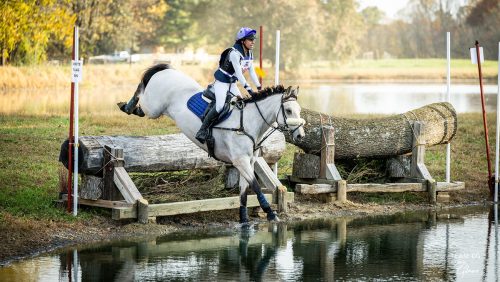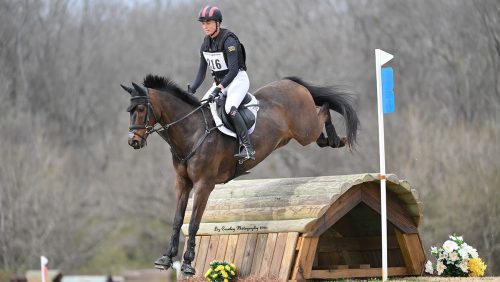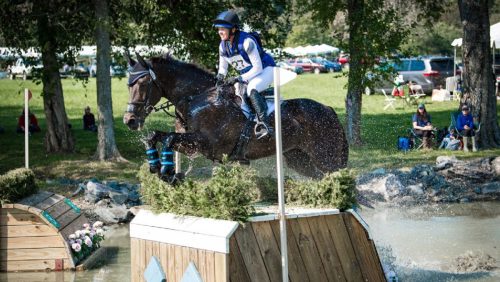It probably sounds strange to non-horsey folk, but I’ve often thought of the relationship with my horse as akin to a marriage. (Bless him, my husband nods thoughtfully when I say this instead of Googling divorce attorneys. Then again, he knows my mare was in the picture before he was.)
We spend way too much time around each other; we know the other’s every strength and weakness, and we are forced to trust each other in a very deep way, in order to continue on together. We’re a partnership, not a dictatorship. And sometimes, we fight.
It’s fair to say that last fall (when everyone else was wrapping up their show seasons with flying colors), Jitterbug and I hit a rough patch. I turned to our counselor, also known as my trainer/barn owner, for some intensive therapy.
When Jitter and I started our lives together 10 years ago, she was an unbroke, semi-feral, wild-eyed draft cross. She had, earlier in her life, been a neglect case who was rescued thanks to a series of kind individuals, and at 5 years old she’d had minimal contact with humans and saw no use for them now. People always ask, “How did the breaking out process go?” and, incredibly, that was not the hard part. “You wanna sit on my back?” she seemed to ask. “Whatever, kid. This is weird, but if that’s your life’s dream, knock yourself out.”
The problem came when she progressed enough that I began giving her instructions. Trot. Turn. Keep trotting. Keep walking. Why have you halted? Walk. Now. Why are you bucking? Could we not?
Cantering was a disaster. Steering was nonexistent or minimal for several years. For a while, she found contact with my lower leg offensive; once that became OK, she decided she hated rein contact, leaning on me like a freight train. And as soon as she got fed up, she had a litany of tricks to confuse or scare me out of giving directions. Much of our relationship, until the last few years, has involved me figuring out how to work through her newest trick of actively or passively resisting me. It has not always been a fun journey. I would marvel at people who talked about riding their horse as a means to forget all their sorrows. As far as I could tell, the closest Jitter came to this for a long time was saying, “I’ll give you something to cry about.”
ADVERTISEMENT
But I loved the athleticism she had (which I’d often muse while hurtling through the air as the result of a bronco buck), her expressiveness, and most of all, that brilliant brain, always several steps ahead. I’d hoped that when we worked through our issues these things would create a brilliant partnership. Finally, in the last several years, they had … until last fall.
It started with a disagreement over a canter transition. I suggested that we should perhaps not take 10 meters to actually complete it, and after my leg went ignored I gently touched her with my dressage whip. She lept forward with some truly impressive bucks, tossed me onto her neck and lingered just long enough at the rail for me to grab one rein as she spun, trying to take off the other way. I regained my stirrups and asked again, expecting a little sheepishness for her outburst, but she repeated the exercise, either walking or furiously bolting for several more loops of the arena. At one point she plain ran off, head in the air and jaw locked.
Once, we forgot that we knew how to walk—there was either trot or halt. It was a nightmare circa 2012 (And yes, I had her checked out, and she had no discernable physical issues; she was actually doing better soundness wise than she had all year.)
We had several more rides like this, arguments that I didn’t want to have and tried my best to avoid. At the end of one, I burst into frustrated tears, cooling her out under the arena lights, grateful no one was there to see me. Perhaps, I was beginning to think, I just wasn’t a competent rider. I’ve never imagined myself as any great talent; I’ve always figured I could ride respectably because I worked really hard at it, not because I had a natural propensity for it. After nearly a decade with this mare, if I couldn’t get a simple, on-the-bit walk, what kind of a rider was I?
Horse shows made me suspect this to be the case. I’ll let you in on a horrid little secret: I haven’t seen a blue in 15 years. Sure, there were gaps in my riding life during that time, and I don’t ride for the ribbons, or else I’d have quit by now, but it is pretty demoralizing to go that long, realizing your best day is never as good as someone else’s “today.” Perhaps all those judges were trying to tell me something—that I’d spent my life trying unsuccessfully to do something I wasn’t made for.
My trainer, who really should apply for some kind of honorary psychology degree by now, considered all of this quietly. We could always lease Jitter to someone, she suggested. She has always been angelic for children and has joyfully taught many a walk/trot lesson. She’s brave on trails and could be someone’s cuddle muffin/occasional trail buddy. But first, she suggested, let’s do a double lesson; we’ll do one on my 3-year-old sale horse and one with Jitterbug.
ADVERTISEMENT
“Spin” was an off-the-track Thoroughbred with a kind face and an incredibly long, beautiful stride. We spent the early part of the lesson confusing each other about how much contact he needed (way less than I was used to), but then we figured things out. He’d spontaneously run out of gas around tough turns as greenies do, but he began to stretch, relax. He picked up his right lead canter on first ask, which was hard for him at the time. Everything I asked, he tried to do. He gave me a gentle bend after I casually suggested the idea, which I am not accustomed to. I felt utterly calm and confident that whatever my trainer was about to ask me to do, I could steer him through. Then she brought Jitter and me back together.
Of course, no one brings out their worst material in front of their marriage counselor, and Jitter innocently did her trot/canter transitions as though, “We’v never had any misunderstanding about this, why do you ask?” We decided my lower leg had gotten weak—that was probably why she saw an opportunity to terrorize me the previous week.
The problem, our therapist explained to us, wasn’t that I couldn’t ride. It was that I’d spent years riding a mare who wanted me to think I couldn’t. The reason Spin was easy and lovely for me was partly because he was a more willing, impressionable partner, but it was also because I spoke to him with authority, patience, responsiveness—all of which I’d learned from Jitter.
As Jitter has gotten older (she’s now 15) I’ve spent some time brooding about what will happen when I lose her. I hope that day is far off and have no reason to think it isn’t. I’d fretted over how much I’d miss her but never thought about where I would go as a rider afterward.
I should know better than this—how many riders have I profiled for Amateur Showcases who are twice my age and still discovering new sports and new mounts? Does my horse not “write” a column about training her rider? I’d always assumed that the joke was she was preparing me to better serve her, but now I realized she, like all horses, is preparing me for the next one.
Whenever you move on to the next horse, my trainer said, it’s going to be so much easier than you realize. Like all therapists, she told me “You’re stronger than you know.”
You’ve gotten to know Jitterbug, the Chronicle’s Quadruped Correspondent, over her years of posting hilarious columns from a cantankerous draft-cross mare’s point of view. And now her “Human,” Natalie Voss, has joined our roster of bloggers to share her adventures as a hunter-rider-turned-eventer mounted on the ever-opinionated Jitterbug.















